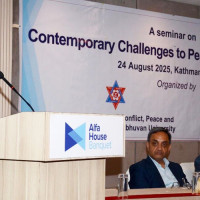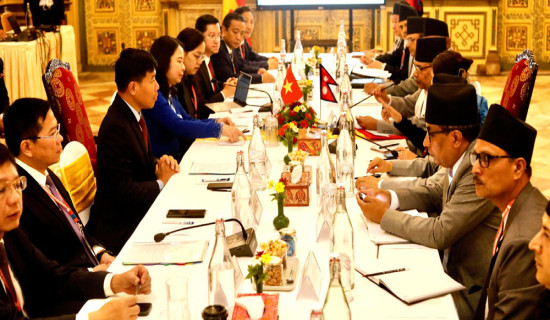- Monday, 25 August 2025
Gen Z Grapples With Information Dilemma
Human history has passed through several revolutions — cognitive, agricultural and industrial — each transforming how we live, think, and relate to one another. But none has invaded the human psyche as rapidly and deeply as the Information Revolution, which began roughly four decades ago. Here in Nepal, it’s only been a little over a decade since the internet truly arrived. And yet, for Generation Z—many of whom had access to smartphones and social media as children — life before the internet feels more like mythology than memory.
We are the first generation in all of human history to have such unfiltered, uninterrupted access to information from birth. Ironically, we’re also among the most confused, overstimulated, and emotionally dulled. We’re a generation raised not by parents or schools, but by screens — and it shows. Somewhere along the way, we misunderstood what the internet was supposed to be. Or maybe we never understood it at all.
Connection
It promised knowledge, connection, and empowerment. But for many of us, it became a distraction, a comparison, and confusion. When was the last time we even used the search button to explore a real question? Most of us haven’t in a while — because the platforms we use don’t encourage curiosity, they predict our behaviour. Google gives you ready-made answers. Facebook serves ads based on your thoughts. YouTube recycles your past in endless loops. TikTok decides your mood for the day.
We’re not just scrolling—we’re being scrolled. There’s a quiet war happening, and we’re all part of it. A war between our brains and our devices. Between our time and their algorithms. Between our need for meaning and their need for clicks. As someone caught in it too, I won’t pretend to be above it. The internet is not a place—it’s a force. And wisdom, within it, is rare. The digital space is fragmented. The research is shallow. Information is endless, but understanding is scarce. We swim in content that’s more likely to traumatise than to enlighten. We no longer know what to seek or what to trust. Often, we aren’t even looking for anything. We’re just trying to pass the time without confronting ourselves.
And when even that gets boring, we keep going—out of habit, not intention. The most tragic casualty of the Information Age may be our inner world. Our thoughts have become like newsfeeds — endless, shallow and fleeting. We don’t hold thoughts anymore. We scroll over them. Laugh at them. Ignore them. React to them instantly, like emojis. Somewhere, thinking stopped being slow and sacred—it became performative, reactive and impulsive.
Fifty years ago, someone would have reflected on a single idea for days. They would analyze, compare, question, and conclude based on personal experience. Today’s teenager forms conclusions at the speed of a meme. We don’t analyse our thoughts—we react to them like we react to posts. And reactions are not reflections. They’re just emotional shortcuts.
Our conclusions aren’t always wrong—but they’re often shallow. And that shallowness can mislead. We begin to mistake emotional reaction for personal truth. We stop reading for pleasure. We stop reading at all—unless it’s for laughs, gossip, or outrage. Even our boredom is no longer productive. It’s something we fear. We’re terrified of spending even a few minutes alone with our minds.
There was a time when children read books out of wonder. That wonder is fading. It’s hard to compete with infinite scrolling. Hard to sit with words on a page when there’s a screen that promises novelty every two seconds. Social media is replacing the garden. Apps are raising our attention spans, or rather, shrinking them. We laugh at misogyny, scroll through suffering, idolise strangers, and ridicule those who once inspired us. We chase difference, yet we conform more than ever—sharing what the cool kid shares, laughing at what they laugh at.
We have mistaken connectivity for connection. We have confused information for insight. And now, in this post-pandemic world, we find ourselves lost in the very system that promised to empower us. But here’s the thing: it’s not over yet. The real Information Revolution hasn’t arrived. What we’ve lived through is more like an attention crisis disguised as progress. But a deeper shift is coming. And before that happens, we must prepare for something even greater.
Spiritual revolution
Not religious. Not institutional. But a return to inner clarity. A rebellion against the noise. A movement back to truth—not just the kind you find on fact-check websites, but the kind you find in silence, in solitude, in observation. The kind of truth that survives your opinions and transcends trends.
You, reader, who made it to the end of this piece—you’re part of that possibility. You're not the only one who can help turn this tide, but you are one of the better ones. We need a generation that reads not just for escape, but for awakening. That thinks not just to argue, but to understand. That uses technology not as a master, but as a tool. It begins with awareness. Then the choice. Then discipline. Let’s not just scroll through history. Let’s be awake enough to write it again.
(A graduate from Tribhuvan University, the author is a tour planner.)



-original-thumb.jpg)



-square-thumb.jpg)

-original-thumb.jpg)







